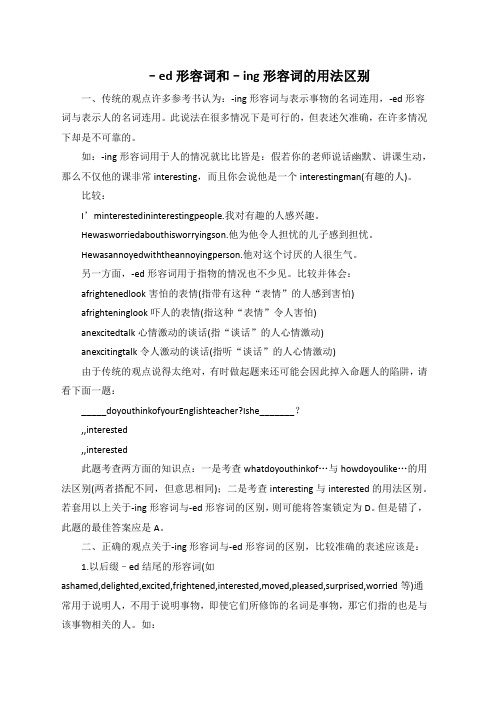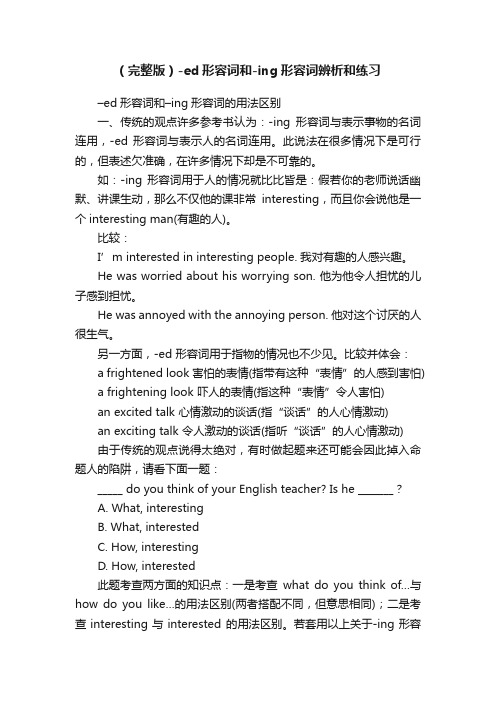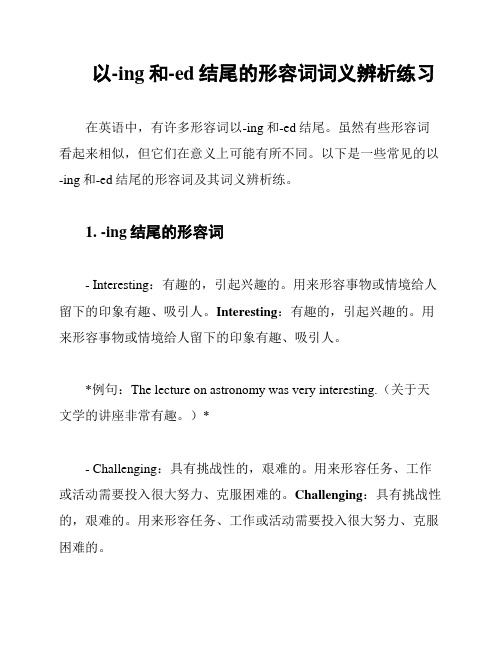ing形容词和ed形容词经典练习
ed形容词和ing形容词辨析和练习

Ireadaninterestedexpressiononhisface.我看到他脸上露出一种感兴趣的表情。
Ireadaninterestingexpression表情。
_____doyouthinkofyourEnglishteacher?Ishe_______?
,,interested
,,interested
此题考查两方面的知识点:一是考查whatdoyouthinkof…与howdoyoulike…的用法区别(两者搭配不同,但意思相同);二是考查interesting与interested的用法区别。若套用以上关于-ing形容词与-ed形容词的区别,则可能将答案锁定为D。但是错了,此题的最佳答案应是A。
Hehadapleasedsmileonhisface.
他脸上露出了满意的微笑。
Hetoldmethenewsinaveryexcitedvoice.
他声音很激动地告诉了我这个消息。
第一句中的apleasedsmile意为“满意的微笑”,它指的是某人因感到满意发出的微笑;
第二句中的averyexcitedvoice指的是“很激动的声音”,即指的是某人因很激动而发生那样的声音。
Thestoryisveryinteresting.这个故事很有趣。
Themanisveryinteresting.这个人很有趣。
请再比较并体会以下句子:
Heisfrightened.他很害怕。Heisfrightening.他很吓人。
Hehasafrightenedlookonhisface.他脸上带有惊恐的神情。
afrightenedlook害怕的表情(指带有这种“表情”的人感到害怕)
ed形容词和ing形容词辨析和练习

–ed形容词和–ing形容词的用法区别一、传统的观点许多参考书认为:-ing形容词与表示事物的名词连用,-ed形容词与表示人的名词连用。
此说法在很多情况下是可行的,但表述欠准确,在许多情况下却是不可靠的。
如:-ing 形容词用于人的情况就比比皆是:假若你的老师说话幽默、讲课生动,那么不仅他的课非常interesting,而且你会说他是一个 interesting man(有趣的人)。
比较:I’m interested in interesting people. 我对有趣的人感兴趣。
He was worried about his worrying son. 他为他令人担忧的儿子感到担忧。
He was annoyed with the annoying person. 他对这个讨厌的人很生气。
另一方面,-ed 形容词用于指物的情况也不少见。
比较并体会:a frightened look 害怕的表情(指带有这种“表情”的人感到害怕)a frightening look 吓人的表情(指这种“表情”令人害怕)an excited talk 心情激动的谈话(指“谈话”的人心情激动)an exciting talk 令人激动的谈话(指听“谈话”的人心情激动)由于传统的观点说得太绝对,有时做起题来还可能会因此掉入命题人的陷阱,请看下面一题:_____ do you think of your English teacher? Is he _______?A. What, interestingB. What, interestedC. How, interestingD. How, interested此题考查两方面的知识点:一是考查what do you think of…与how do you like…的用法区别(两者搭配不同,但意思相同);二是考查interesting与interested的用法区别。
(完整版)-ed形容词和-ing形容词辨析和练习

(完整版)-ed形容词和-ing形容词辨析和练习–ed形容词和–ing形容词的用法区别一、传统的观点许多参考书认为:-ing形容词与表示事物的名词连用,-ed 形容词与表示人的名词连用。
此说法在很多情况下是可行的,但表述欠准确,在许多情况下却是不可靠的。
如:-ing 形容词用于人的情况就比比皆是:假若你的老师说话幽默、讲课生动,那么不仅他的课非常interesting,而且你会说他是一个interesting man(有趣的人)。
比较:I’m interested in interesting people. 我对有趣的人感兴趣。
He was worried about his worrying son. 他为他令人担忧的儿子感到担忧。
He was annoyed with the annoying person. 他对这个讨厌的人很生气。
另一方面,-ed 形容词用于指物的情况也不少见。
比较并体会:a frightened look 害怕的表情(指带有这种“表情”的人感到害怕)a frightening look 吓人的表情(指这种“表情”令人害怕)an excited talk 心情激动的谈话(指“谈话”的人心情激动)an exciting talk 令人激动的谈话(指听“谈话”的人心情激动)由于传统的观点说得太绝对,有时做起题来还可能会因此掉入命题人的陷阱,请看下面一题:_____ do you think of your English teacher? Is he _______?A. What, interestingB. What, interestedC. How, interestingD. How, interested此题考查两方面的知识点:一是考查what do you think of…与how do you like…的用法区别(两者搭配不同,但意思相同);二是考查interesting与interested 的用法区别。
ing形容词和ed形容词经典练习

一般现在时和现在进行时练习题一、选择题练习1.Who_____overtherenow???A.singing??B.aresing??C.issinging??D.sing2.It’seighto’clock.Thestudents_____anEnglishclass.??A.have??B.having??C.ishavingD.arehaving3.Listen!Thebaby_____inthenextroom.??A.crying??B.cried??C.iscrying???D.cries4.Look!Thetwins_____newsweaters.??A.arewearing??B.wearing??C.arewear??D.iswearing5.Don’ttalkhere.Grandparents_____.A.issleeping??B.aresleeping??C.sleeping??D.sleep6.Tomisaworker.He_____inafactory.Hissisters_____inahospital.??A.work/work??B.works/work??C.work/works7.Who_____Englishbestinyourclass???A.speak??B.speaks??C.speaking8.MrsRead_____thewindowseveryday.??A.iscleaning??B.clean??C.cleans9.We_____musicandoften_____tomusic.??A.like/listen??B.likes/listens??C.like/arelistening10.She_____upatsixinthemorning.??A.get??B.gets??C.getting11.OnSundayhesometimes_____hisclothesandsometimes_____someshopping.??A.wash/do??B.iswashing/isdoing??C.washes/does12.Thetwinsusually_____milkandbreadforbreakfast,butJim_____somecoffeeforit.??A.have/have??B.have/has??C.has/have二、填空:1.Myfatheralways__________(come)backfromworkverylate.2.Theteacherisbusy.He__________(sleep)sixhoursaday.3.Listen!Joan__________(sing)intheclassroom.Sheoften__________(sing)there.4.__________yourbrother__________(know)Japanese?5.Where__________you__________(have)luncheveryday?6.Thegirl__________(like)wearingaskirt.Look!She__________(wear)aredskirttoday.三、写出下列动词的现在分词形式1.work___________??sing__________????play__________????study__________2.dance__________????have__________????write__________????take__________3.run__________????sit__________????shop__________?????swim__________4.lie__________四、写出下列动词的第三人称单数形式1.work__________????read__________????clean__________????write__________2.teach__________????wash__________????guess__________????watch__________3.go__________????do___________????photo__________4.study__________????fly__________????cry_ _________????play_________一?用括号内所给动词的-ed形式或-ing形式填空?1.?The?children?were?after?the?trip.?(tire)??2.?The?trip?was.?(tire)?3.?The?children?went?to?bed?early?after?the?trip.?(tire)?4.?The?trip?lasted?a?whole?day.?(tire)?5.?The?trip?made?the?children.?(tire)?6.?The?bad?weather?made?the?trip.?(tire)?7.?Tom’s?parents?are?____?at?his?____?results?of?the?exams.(disappoint)?8.?and?angry,?he?left?the?meeting-room.?(disappoint)9.?It?is?that?he?didn’t?pass?the?examination.(disappoint)?10.?When?hearing?thenews?that?Michael?Jackson?passed?away,?they?wereto?look?at?each?other.?(surprise)?11.?He?was?about?his??son.?(worry)?二、选择题()1.The?little?boy?isnotgetting?on?well?in?maths?and?worse?still,?he?is?even?unwilling?to?go?to?school.?With?her?son?_____,?she?feels?very?______.??A.?disappointing;?worrying????????B.?disappointing;?worried??C.?disappointed;?worried??D.?disappointed;?worrying?()2.?After?the?Anti-terrorist?War,?the?American?soldiers?returned?home,??______.??A.?safe?but?tired??????????B.?safely?but?tired???C.?safe?and?tiring???D.?safely?and?tiring?()3.?As?we?all?know,?typing?is?a?______?job?to?a?______?heart.??A.?tired;?tired??????B.?tired;?tiring???C.?tiring;?tired??????D.?tiring;?tiring?()4._____?do?you?think?of?your?English?teacher??Is?he?_______??A.?What,?interesting????????B.?What,?interested???C.?How,?interesting????????????D.?How,?interested??V-ed形式的用法过去分词作定语I.基本了解1.V-ed形式的构成V-ed形式有规则变化和不规则变化之分。
ing形容词和ed形容词经典练习

ing形容词和ed形容词经典练习一般现在时和现在进行时练习题一、选择题练习1. Who _____ over there now? A.singing B. are sing C. is singing D. sing2. It’s eight o’clock. The students _____ an English class. A. have B. having C. is having D. are having3. Listen! The baby _____ in the next room. A. crying B. cried C. is crying D. cries4. Look! The twins _____ new sweaters. A. are wearing B. wearing C. are wear D. is wearing5. Don’t talk here. Grandparents _____. A. is sleeping B. are sleeping C. sleeping D. sleep6. Tom is a worker. He _____ in a factory.His sisters _____ in a hospital.A. work/ workB. works/ workC. work/ works7. Who _____ English best in yourclass? A. speak B. speaks C. speaking8. Mrs Read _____ the windows every day. A. is cleaning B. clean C. cleans9. We _____ music and often _____ to music. A. like/ listen B. likes/ listens C. like/ are listening10. She _____ up at six in the morning. A. get B. gets C. getting11. On Sunday he sometimes _____ his clothes and sometimes _____ some shopping.A. wash/ doB. is washing/ is doingC. washes/ does12. The twins usually _____ milk and bread for breakfast, but Jim _____ some coffee for it.A. have/ haveB. have/ hasC. has/ have 二、填空:1. My father always __________(come) back from work very late.2. The teacher is busy. He __________ (sleep) six hours a day.3. Listen! Joan __________(sing) in the classroom. She often __________ (sing) there.4. __________ your brother__________(know) Japanese?5. Where __________ you __________ (have) lunch every day?6. The girl __________(like) wearing a skirt. Look! She __________(wear) a red skirt today.三、写出下列动词的现在分词形式1.work___________ sing__________ play___ _______ study__________2.dance__________ have__________ write__ ________ take__________3.run__________ sit__________ shop______ ____ swim__________4. lie__________四、写出下列动词的第三人称单数形式1.work__________ read__________ clean__ ________ write__________2.teach__________ wash__________ guess__ ________ watch__________3.go__________ do___________ photo____ ______4.study__________ fly__________ cry__________ play_________一用括号内所给动词的-ed形式或-ing形式填空1. The children were after the tri p. (tire)2. The trip was . (tire)3. The children went to bed earl y after the trip. (tire)4. The trip lasted a whole day. (tire)5. The trip made the children . (tire)6. The bad weather made the trip. (tire)7. Tom’s parents are ____ at his ____ resul ts of the exams.(disappoint)8. and angry, he left the meeting -room. (disappoint)9. It is that he didn’t pass the exa mination.(disappoint)10. When hearing thenews that Michael Jackson passed away, they we reto look at each other. (surprise)11. He was about hisson. (worry)二、选择题( )1. The little boy is not getting on well in maths and worse still,he is even unwilling to go to school. With her so n _____, she feels very ______.A. disappointing; worryingB. disappointing ; worriedC. disappointed; worriedD. disappointed;worrying( )2. After the Anti-terrorist War, the America n soldiers returned home, ______.A. safe but tiredB. safely but tiredC. safe and tiringD. safely and tiring( )3. As we all know, typing is a ______ job to a ______ heart.A. tired; tiredB. tired; tiringC. tiring; tiredD. tiring; tiring( )4. _____ do you think of your English teacher? Is h e _______?A. What, interestingB. What, interestedC. How, interestingD. How, interestedV-ed形式的用法过去分词作定语I. 基本了解1. V-ed 形式的构成V-ed形式有规则变化和不规则变化之分。
以-ing和-ed结尾的形容词搭配练习

以-ing和-ed结尾的形容词搭配练习本文档旨在提供关于以-ing和-ed结尾的形容词搭配的练。
以下是一些常见的例子和联系问题。
-ing形容词的用法1. 请填写下列句子中空格处需要使用以-ing结尾的形容词。
- The movie was __________ (boring) and I ___ it.- She looked __________ (stunning) in her new dress.- The children were __________ (exciting) to go to the amusement park.2. 请将以下名词转换为以-ing结尾的形容词并填入空格中。
- danger: __________- interest: __________- amuse: __________- relax: __________-ed形容词的用法1. 请填写下列句子中空格处需要使用以-ed结尾的形容词。
- The news was __________ (unexpected) ___ surprise.- The meal was __________ (us) and I ___.- After the long hike, I felt __________ (exhausted) but satisfied.2. 请将以下名词转换为以-ed结尾的形容词并填入空格中。
- amaze: __________- inspire: __________- interest: __________- disappoint: __________总结本文档提供了以-ing和-ed结尾的形容词的练习。
通过填写空格,并结合相应的名词转换,您可以巩固对这些形容词的理解和正确用法。
希望这些练习对您的英语学习有所帮助!。
以-ing和-ed结尾的形容词词义辨析练习

以-ing和-ed结尾的形容词词义辨析练习在英语中,有许多形容词以-ing和-ed结尾。
虽然有些形容词看起来相似,但它们在意义上可能有所不同。
以下是一些常见的以-ing和-ed结尾的形容词及其词义辨析练。
1. -ing结尾的形容词- Interesting:有趣的,引起兴趣的。
用来形容事物或情境给人留下的印象有趣、吸引人。
Interesting:有趣的,引起兴趣的。
用来形容事物或情境给人留下的印象有趣、吸引人。
*例句:The lecture on astronomy was very interesting.(关于天文学的讲座非常有趣。
)*- Challenging:具有挑战性的,艰难的。
用来形容任务、工作或活动需要投入很大努力、克服困难的。
Challenging:具有挑战性的,艰难的。
用来形容任务、工作或活动需要投入很大努力、克服困难的。
*例句:Running a marathon is a challenging experience.(参加马拉松是一次具有挑战性的经历。
)*- Exciting:令人兴奋的,激动人心的。
用来形容引起强烈兴奋、激动的事物或情景。
Exciting:令人兴奋的,激动人心的。
用来形容引起强烈兴奋、激动的事物或情景。
*例句:The roller coaster ride was very exciting.(坐过山车很令人兴奋。
)*2. -ed结尾的形容词- Bored:感到厌烦的,无聊的。
用来形容因缺乏刺激、无聊而感到厌烦的状态。
Bored:感到厌烦的,无聊的。
用来形容因缺乏刺激、无聊而感到厌烦的状态。
*例句:She felt bored during the long lecture.(她在长时间的讲座中感到很无聊。
)*- Pleased:感到高兴的,满意的。
用来形容因某种原因而感到高兴、满意的情绪。
Pleased:感到高兴的,满意的。
用来形容因某种原因而感到高兴、满意的情绪。
根据ing形容词和ed形容词经典练习

根据ing形容词和ed形容词经典练习根据-ing形容词和-ed形容词经典练这份文档旨在提供一些经典的练,帮助读者更好地理解和运用-ing形容词和-ed形容词。
下面是一些例子和解析,供您参考。
-ing形容词- "interesting" 表示引起兴趣的,如 "an interesting book" (一本有趣的书)。
- "boring" 表示令人无聊的,如 "a boring movie" (一部无聊的电影)。
- "exciting" 表示令人兴奋的,如 "an exciting adventure" (一次激动人心的冒险)。
-ed形容词- "interested" 表示感兴趣的状态,如 "I am interested in learning English" (我对研究英语感兴趣)。
- "bored" 表示感到无聊的状态,如 "He looked bored during the lecture" (他在讲座期间看起来很无聊)。
练题请根据下面的句子选择适当的形容词填空。
1. The movie was __________. (exciting / excited)2. He seemed __________ during the meeting. (interested / interesting)3. I felt __________ after finishing the marathon. (tired / tiring)4. The book was __________. (bored / boring)答案解析1. The movie was exciting. 此处需要用-ing形容词来修饰名词"movie",表示电影本身很令人兴奋。
- 1、下载文档前请自行甄别文档内容的完整性,平台不提供额外的编辑、内容补充、找答案等附加服务。
- 2、"仅部分预览"的文档,不可在线预览部分如存在完整性等问题,可反馈申请退款(可完整预览的文档不适用该条件!)。
- 3、如文档侵犯您的权益,请联系客服反馈,我们会尽快为您处理(人工客服工作时间:9:00-18:30)。
一般现在时和现在进行时练习题一、选择题练习1. Who _____ over there now? A. singing B. are sing C. is singing D. sing2. It’s eight o’clock. The students _____ an English class. A. have B. having C. is having D. are having3. Listen! The baby _____ in the next room. A. crying B. cried C. is crying D. cries4. Look! The twins _____ new sweaters. A. are wearing B. wearing C. are wear D. is wearing5. Don’t talk here. Grandparents _____. A. is sleeping B. are sleeping C. sleeping D. sleep6. Tom is a worker. He _____ in a factory. His sisters _____ in a hospital.A. work/ workB. works/ workC. work/ works7. Who _____ English best in your class? A. speak B. speaks C. speaking8. Mrs Read _____ the windows every day. A. is cleaning B. clean C. cleans9. We _____ music and often _____ to music. A. like/ listen B. likes/ listens C. like/ are listening10. She _____ up at six in the morning. A. get B. gets C. getting11. On Sunday he sometimes _____ his clothes and sometimes _____ some shopping.A. wash/ doB. is washing/ is doingC. washes/ does12. The twins usually _____ milk and bread for breakfast, but Jim _____ some coffee for it.A. have/ haveB. have/ hasC. has/ have二、填空:1. My father always __________(come) back from work very late.2. The teacher is busy. He __________ (sleep) six hours a day.3. Listen! Joan __________(sing) in the classroom. She often __________ (sing) there.4. __________ your brother __________(know) Japanese?5. Where __________ you __________ (have) lunch every day?6. The girl __________(like) wearing a skirt. Look! She __________(wear) a red skirt today.三、写出下列动词的现在分词形式1. work___________ sing__________ play__________ study__________2. dance__________ have__________ write__________ take__________3. run__________ sit__________ shop__________ swim__________4. lie__________四、写出下列动词的第三人称单数形式1. work__________ read__________ clean__________ write__________2. teach__________ wash__________ guess__________ watch__________3.go__________ do___________ photo__________4.study__________ fl y__________ cry__________ play_________一用括号内所给动词的-ed形式或-ing形式填空1. The children were after the trip. (tire)2. The trip was . (tire)3. The children went to bed early after the trip. (tire)4. The trip lasted a whole day. (tire)5. The trip made the children . (tire)6. The bad weather made the trip . (tire)7. Tom’s parents are ____ at his ____ results of the exams.(disappoint)8. and angry, he left the meeting-room. (disappoint)9. It is that he didn’t pass the examination.(disappoint)10. When hearing the news that Michael Jackson passed away, they were to look at each other. (surprise)11. He was about his son. (worry)二、选择题( )1. The little boy is not getting on well in maths and worse still,he is even unwilling to go to school. With her son _____, she feels very ______.A. disappointing; worryingB. disappointing; worriedC. disappointed; worriedD. disappointed; worrying( )2. After the Anti-terrorist War, the American soldiers returned home, ______.A. safe but tiredB. safely but tiredC. safe and tiringD. safely and tiring( )3. As we all know, typing is a ______ job to a ______ heart.A. tired; tiredB. tired; tiringC. tiring; tiredD. tiring; tiring( )4. _____ do you think of your English teacher? Is he _______?A. What, interestingB. What, interestedC. How, interestingD. How, interestedV-ed形式的用法过去分词作定语I. 基本了解1. V-ed 形式的构成V-ed形式有规则变化和不规则变化之分。
规则的V-ed形式由动词原形加词尾-ed构成,不规则的V-ed形式情况各异。
2. V-ed 形式的意义及物动词的V-ed形式表示被动和完成,不及物动词的V-ed形式仅表示完成。
[自填助记]a(n) cup 一个破杯子the novel 出版了的小说a(n) country 发达国家the leaves 落叶[Key] broken; published; developed; fallenII. V-ed形式作定语时的位置及意义1. 位置单个V-ed形式作定语时要放在被修饰的词语之前,V-ed形式短语作定语时要放在被修饰的词语之后。
[自填助记]① He is __________________________________(一名退休工人).② _________________________________(那个丢失的孩子) was found at last.③ __________________________ (那个在电影院里丢失的孩子) was found at last.④ We are going to talk about the problem __________________ (上次会上讨论的).[Key]① a retired worker ②The lost child③ The child lost in the cinema ④ discussed at the last meeting2. 意义(1) V-ed形式作定语,意义上相当于一个定语从句。
(2) 及物动词的V-ed形式和逻辑主语(即它所修饰的名词)之间是被动关系,强调动作已完成,可以替换为一个谓语动词是被动语态的定语从句。
(3) 不及物动词的V-ed形式和逻辑主语之间是主动关系(即只说明逻辑主语所处的状态和具有的特点等),强调动作已完成,可以替换为一个谓语动词是主动语态的定语从句。
[自填助记]① The house, built a hundred years ago, stood still after the earthquake.= The house, _____________ a hundred years ago, stood still after the earthquake.② There are a lot of fallen leaves in autumn.= There are a lot of leaves _____________ in autumn.[Key] ① which was built ② which / that have fallen[高考链接]1. For breakfast he only drinks juice from fresh fruit on his own farm. [2009年北京卷]A. grownB. being grownC. to be grownD. to grow2. The trees in the storm have been moved off the road. [2008年湖南卷]A. being blown downB. blown downC. blowing down D to blow down3. It is one of the funniest things on the Internet so far this year. [2008年浙江卷]A. findingB. being foundC. to findD. found4. The Town Hall in the 1800’s was the most distinguished building at that time. [2007年上海卷]A. to be completedB. having been completedC. CompletedD. being completed5. “Things never come again!” I couldn’t help talking to myself. [2007年湖南卷]A. lostB. LosingC. to loseD. have lost[Key] 1.A 2. B 3. D 4. C 5. A过去分词作宾语补足语内容简介:过去分词作宾补,表示被动或完成意义。
